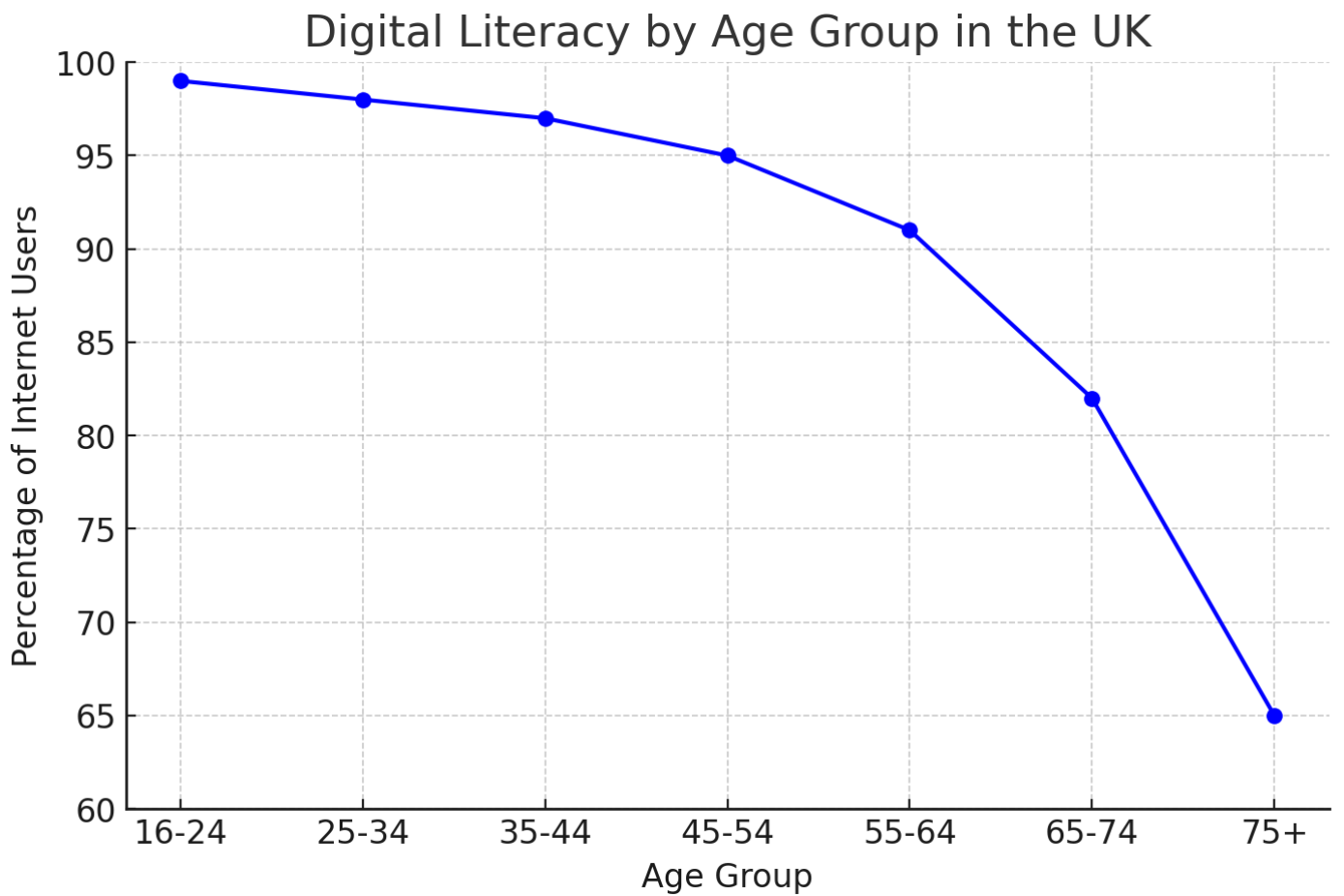Digital health literacy, defined as the ability to seek, understand, and use health-related information from electronic sources, is becoming increasingly vital for older adults to manage their health effectively. In Cumberland, improving digital health literacy among the ageing population is essential to ensure equitable access to healthcare resources, telehealth services, and online health information.
Research highlights that digital health literacy interventions can significantly improve knowledge, confidence, and engagement with online health resources, though practical skills development may require more targeted support (Zhao et al, 2022). Factors influencing digital health literacy include age, education level, access to digital devices, and availability of social support networks, all of which determine an individual’s ability to engage with digital healthcare tools effectively (Grüning et al, 2023). Addressing these barriers through structured interventions and accessible digital health resources is critical in enabling older adults to navigate the digital healthcare landscape independently.
Barriers to Digital Literacy in Cumberland
Older adults in Cumberland face several challenges that hinder their engagement with digital health services. Digital exclusion is a key issue, particularly in rural areas where internet access is limited, and older adults may have fewer opportunities for digital literacy training (Cumberland Council, 2023). Many older residents also struggle with accessing online GP services, ordering prescriptions digitally, or using wearable health technology, creating disparities in healthcare access and self-management (Public Health England, 2021).

Figure 9: Digital Literacy by Age Group in the UK
Source: Office for National Statistics (ONS), Internet Access – Households and Individuals, 2023
National data (figure 9) indicates that while internet usage is high among younger age groups, there is a notable decline among those aged 65 and over. This trend suggests that older adults may face challenges related to digital literacy, which could impact their ability to access online health resources effectively. This will need to be addressed as we become more reliant on technology and healthcare services continue to become more digitised.
Many older adults are hesitant to use digital health platforms due to concerns about privacy, security, and the reliability of online health advice. Building trust in these tools is key to increasing their adoption (Zhao et al, 2022). These issues are exacerbated by economic barriers, as some older residents may lack the financial resources to afford smartphones, tablets, or reliable broadband connections (Cumberland Council, 2023).
Digital tools, such as the NHS App, have the potential to make healthcare more accessible, but not everyone can use them easily. Many older adults face challenges with digital literacy and relying too heavily on online services risks leaving some people behind. A balanced approach, one that maintains phone and in-person options alongside digital tools, will be essential.
The NHS App enables users to book GP appointments, order prescriptions, and access their health records, yet evidence suggests that uptake among older adults remains low, with barriers including lack of digital confidence, concerns about data security, and difficulty navigating the interface (Palmer et al., 2023). Additionally, studies indicate that digital health interventions must be accompanied by human support mechanisms to be effective, as many older adults benefit from guided learning rather than self-directed app use (Watson et al., 2022). Over-reliance on the NHS App as a primary route for healthcare access may therefore widen health inequalities rather than reduce them, particularly in rural areas like Cumberland where digital infrastructure is inconsistent. A more balanced approach is needed, integrating face-to-face, telephone, and digital services to ensure that technology complements rather than replaces traditional healthcare pathways (Greenhalgh et al., 2023).
Initiatives to Improve Digital Health Literacy in Cumberland
To bridge the digital divide and improve digital health literacy among older adults, Cumberland has implemented several initiatives. However, ongoing efforts are required to ensure digital solutions are accessible, inclusive, and do not replace traditional healthcare access routes. The following strategies combine current initiatives with recommendations for future improvements to create a more sustainable and effective approach.
- Cumberland Digital Inclusion Programme: Cumberland Council has launched community-based digital literacy training for older adults, covering NHS online services, digital prescriptions, and GP appointment booking via NHS apps.
🔹 Future Action: Expand training to include alternative healthcare access options (e.g., telephone services) and focus on guided, long-term digital support rather than one-off sessions. - Broadband Expansion in Rural Areas: Recognising digital infrastructure challenges, Cumberland Council is working with government initiatives to expand high-speed broadband access in rural areas.
🔹 Future Action: Ensure broadband expansion is complemented by affordable internet access schemes and offline service options for those who remain digitally excluded. - Library-Based Digital Literacy Support: Public libraries now provide one-on-one digital health support, assisting older adults with NHS websites, video consultations, and navigating health apps.
🔹 Future Action: Implement trained staff in GP surgeries and libraries who can offer on-demand, ongoing digital support rather than ad-hoc sessions. - Community-Led Support Networks: Charities, including Age UK Carlisle & Eden, offer peer-led digital skills workshops to help older adults gain confidence using smartphones, health apps, and wearable technology.
🔹 Future Action: Shift focus beyond basic digital skills to include more advanced skills, in order to help older adults better access online health information and build trust in digital platforms. - Maintaining Hybrid Healthcare Access: Recognising concerns about over-reliance on the NHS App, Cumberland is committed to ensuring digital tools complement rather than replace face-to-face and telephone healthcare services.
🔹 Future Action: Advocate for local NHS services to maintain non-digital appointment booking, ensuring that older adults have multiple access points to care.
By fostering digital health literacy through these community-driven and technology-inclusive initiatives, Cumberland is taking steps to ensure older residents can access healthcare information, communicate with providers, and manage their health independently